- Home
- Peter Swanson
The Kind Worth Killing Page 8
The Kind Worth Killing Read online
Page 8
I dressed and slipped out of the room, not leaving a note. I felt better once I was on the cliff walk, enveloped in the cold mist, staring out toward the opaque ocean. I walked fast, concentrating on the slippery footing, trying not to think of the last time I had taken this route to the house. When I reached the end of the walk, I checked my watch, noting that it had taken a little over thirty minutes to reach my new home from the Kennewick Inn. I stood on the bluff, staring toward the rear of my house. I wasn’t afraid of being spotted this time. I was a lord surveying my manor. I walked across the damp stretch of land, then looped around toward the front of the house through a stand of balsam firs. As I approached the driveway, I watched a truck pull away, and assumed I had just missed Brad. But as I came fully around the house, I saw his two-toned pickup truck, with him next to it, a cigarette jutting from his lips. He was punching a number into his cell phone, but stopped when he spotted me. He smiled and the cigarette bobbed up and down. I smiled back and walked toward him, hand outstretched.
It was time I got to know Brad Daggett.
CHAPTER 8
LILY
I hadn’t planned on falling in love, but who does? Eric Washburn was a junior, and president of a “literary” fraternity at Mather called St. Dunstan’s, although I didn’t know that at the time I met him. We met in the library. It was closing time on a frigid February night, and we were the last to leave, passing through the swinging glass doors together into an eye-watering wind. Eric offered me a cigarette, which I didn’t accept, then lit his own, and asked me what direction I was going in. He walked me to Barnard Hall, a gesture that at the time seemed born entirely from gallantry, and not from more sinister motives. At my entryway, he invited me to a Thursday night party at St. Dunstan’s. I told him I would come. He wasn’t particularly handsome; he had a long face and a high forehead, a bony nose and too-big ears, but was tall and slender, and his voice was deep and almost melodic. That night he was wearing a long, charcoal gray coat and a burgundy scarf that he had wrapped several times around his neck. I had heard of St. Dunstan’s, knew that it was the most elite society at a college that already had its share of prep-school snobbery, and I was very familiar with its location, the Manor, a stone and slate piece of Gothic Revival architecture that broached the northern edge of campus, where Mather spilled out into the urban wasteland of New Chester’s streets. It was a beautiful building, its stonework gilded with carvings and gargoyles, its front door tall and arched, and its windows all of stained glass. It was the type of architecture that had attracted me to the college in the first place. I’d looked at several places, but Mather, a two-hundred-year-old private college with just under a thousand students, had been the only place that felt right. With its gabled brick dorms, its archways, its elm-lined quad, it was like a campus stuck in some earlier time, the campus of a mystery novel set in the 1930s, where boys sang in barbershop quartets and girls in skirts walked briskly from class to class. To the deep dismay of my mother—who had been lobbying for Oberlin, her own alma mater, since I was five—and the unsurprising indifference of my father, I’d chosen Mather.
“Lily,” Eric said, after inviting me to Dunstan’s, “what’s your family name?”
“Kintner.”
“Oh, right. You’re Kintner. I heard you were here.” The way he’d said it sounded a little rehearsed, as though he’d already known who I was.
“You know my father?”
“Of course I do. He wrote Left over Right.”
I was surprised. Most of my father’s fans mentioned Slightest Folly, his boarding school farce, and I had never heard anyone mention his comedy about the life of a London tailor.
“What time?” I asked. I was propping open Barnard’s exterior door and was anxious to get inside.
“Ten-ish. Wait, hold on.” Eric dug into the pocket of his large coat and pulled out a small square card that he handed to me. It was white, printed with a letterpress image of a skull. “Show this at the front door.”
I said good night and entered my dorm. Jessica, my roommate, was still up and I told her about the invite. She was deeply invested in the social life of Mather and I was curious what she would know about Eric Washburn and the Thursday night party.
“You got a skull card,” she said and snatched it from my fingers. Then said, even louder, “You got a skull card from fucking Eric Washburn.”
“What do you know about him?”
“He’s like royalty. I think his great-great-great-great-grandfather basically built Mather. You honestly hadn’t heard of him?”
“I’ve heard of St. Dunstan’s.”
“Well, of course you’ve heard of St. Dun’s. Is the invite a plus one?”
“I don’t think so. He didn’t say it was.”
I went to the party, and I went alone. Eric was there, behind the bar when I first arrived, and he made me a vodka tonic without asking me what I wanted first. Then he took me by the arm and introduced me to several St. Dunstan’s members before returning to his bartending duties. He said it was a rotating Thursday night job and he’d drawn the short straw. I was slightly disappointed with the interior of the Manor, expecting something that more closely matched its Gothic exterior. I don’t know what exactly. Persian rugs and leather chairs? Instead, it was a slightly nicer version of the other fraternities I’d been to my freshman year. Low-ceilinged rooms, tatty furniture, and the ubiquitous smell of Marlboro Lights and cheap beer. I wandered its first-floor rooms, talking to several members, many of whom asked me about my father. After drinking my third vodka I went to the bar to say good-bye to Eric and thank him for inviting me.
“Come next week,” he said, and dug out another skull invite for me from his pocket. “I won’t be bartending.”
When I got home, Jessica pressed me for every detail. I told the truth, that there was nothing particularly interesting about St. Dunstan’s, and that everyone there seemed nice while not being wildly fascinating. I told her there were no secret passageways, or initiation rituals. I told her that there wasn’t a room lined with the skulls of freshman girls.
“Gross, Lily. You didn’t meet Matthew Ford, did you?”
“I met a Matthew. He was short with long bangs.”
“God, he’s hot.”
For better or for worse, St. Dunstan’s became my primary social life that winter and spring. I went to all their Thursday night parties, and an occasional dinner party as one of the members’ date. I wasn’t sure why I was invited as often as I was. Eric seemed to have a girlfriend, a fellow junior named Faith who tended to hang around him toward the end of most parties. One night, I walked into the billiard room at the Manor and saw them kissing. They were pressed up against a built-in bookshelf. Faith was on the tips of her toes, and even so, Eric had to stoop to kiss her. One of his hands was tangled in her hair and the other was pressed against the small of her back. Eric was facing me and we made brief eye contact as I backed out of the room.
Other members of the society (St. Dunstan’s was technically not a fraternity, and they didn’t refer to themselves as brothers) would occasionally make a pass at me, but never in the groping, sweaty way that I had experienced at fraternity houses the few times I had gone with Jessica my fall semester. No, the passes at Thursday night parties were usually slurred compliments about my looks, followed by clumsy offers of another drink, or some other recreational drug, in their dorm room. I always refused, not because the boys who made the offers were particularly repellent but because, despite the presence of beautiful, dark-haired Faith, I was in love with Eric Washburn, and had been, since the first party at the Manor, when he had slipped from behind the bar to guide me around the rooms, introducing me to his friends. It was the way he had held my arm, just above the elbow, as though he were telling me, and others, that I belonged to him, if only slightly. Eric was the reason I kept going to St. Dunstan’s, although I enjoyed talking to other members, even when they were making drunken passes. The boys I met there could easily have bee
n classified as preppy snobs, boys who had been born on third base and thought they hit a triple (as my mother often quoted), but they were also usually polite, and made conversation in which the main point was not how wasted they had been the night before, or how wasted they planned on getting tonight. They were boys pretending to be men, so they tried a little harder to impress me with thoughts on politics, and ideas about literature. And even if it was all a ruse, I appreciated the effort.
Because I had first been invited to St. Dunstan’s by Eric, I would usually seek him out to say good-bye when I left one of the Thursday night parties. He would press one of the skull cards into my hand and ask me to come the following week. If he wasn’t around at the end of a party, he would manage to find me at some point during the week to give me an invite, and once, he left a card in my mailbox at the student center. I considered the invites evidence of a small romance. A very small one, but it was also my first. And it was enough for me.
My last exam of freshman year was on a Tuesday afternoon, and I had arranged to take the bus the following morning from New Chester to Shepaug, where my mother would pick me up and drive me to Monk’s. After my exam I had planned on packing up my few belongings while enjoying the solitude of a final night in Barnard Hall. Jessica had finished her exams early and left the day before. Coming back from my American Lit Survey exam I found a skull card on the linoleum floor of my dorm room, a message from Eric scrawled on the back. “Two full kegs. Come help us finish them tonight.” After finishing my packing, I walked across the muddy campus toward the Manor, and wasn’t surprised to find only a few members and a few girlfriends circled around the bar. Most students had already left. Eric seemed wildly pleased to see me, and I drank more than I usually did, happy to note that Faith was nowhere around. I even asked Eric about her.
“Oh, she’s gone, Kintner. Literally and figuratively.”
“What do you mean?” I had a sudden horrific feeling that she’d died and I hadn’t heard about it.
“She’s gone from here.” He gestured around him with an open palm. “And she’s gone from here.” He pointed at his heart, and several of his friends guffawed. I realized that Eric was drunker than I’d seen him before.
“I’m sorry,” I said.
“Don’t be sorry. She was not for me. Good riddance and good luck.” He made another theatrical gesture. I suddenly knew that Eric had invited me to St. Dun’s that night in order to seduce me, and that I was going to let him do it. It was what I had been waiting for. I had no illusions that it would be anything other than a one-night stand, but I was a virgin and I had decided that the time was right. I was not so foolish as to believe that I had to lose my virginity to someone who was in love with me, but it was important that I lose my virginity to someone that I loved.
St. Dunstan’s Manor had three single bedrooms on its second floor. Since Eric was president, he had the largest room, a high-ceilinged single with a view toward the college chapel. Instead of a single utilitarian cot, he had a four-poster bed made of darkly stained wood. Eric seemed more nervous than I was at first as we lay, fully clothed, kissing on his bed. He excused himself to go to the bathroom, so I took off my clothes and got under the covers. When he returned he had splashed cold water on his face and his mouth tasted of toothpaste. He stripped to his boxers and slid under the covers with me.
“Should I wear a condom?” he asked.
I told him yes. I didn’t tell him I was a virgin because I didn’t want him to have second thoughts. We had sex twice that night, the first time with him on top of me. Because of his height I found myself fixated on the few sparse hairs that covered the center of his thin chest in a triangle formation. He moved awkwardly and I wasn’t sure he was enjoying himself but when I lifted my knees high up by his sides he said my name in a high, breathy voice, and it was over. Later that night, we had sex again with me on top. It was helpful to see his face below me, lit dimly by a streetlamp through his window. I had come to love his face, even for all its awkwardness. The saucer ears, the expanse of forehead, the thin lips. Eric had stunning eyes, dark brown and with beautiful thick eyelashes like a girl’s. While on top of him, I changed the rhythm, slowing down, then speeding up again. After doing this several times, Eric suddenly pulled me down toward him, took one of my nipples into his mouth, and shuddered. Later he asked me if I’d had an orgasm. I told him that I hadn’t but that it had felt good, which was the truth. I left before dawn. He was stirring as I dressed, but I managed to get out of the room before he woke. I didn’t want to listen to false promises. Over the summer, I wanted my memories of Eric to only be good ones.
That summer was the first one after my parents’ divorce was final. My mother was manic, obsessing over rumors that David was already engaged again, and frantically putting together a show for a New York gallery. I spoke with my father on the phone twice; he invited me to visit him in London, but I declined, happy to spend a summer in Connecticut, reading. Monk’s was blessedly empty of houseguests. My benign aunt was around for all of August but my mother had elected for a moocher-free summer, as she put it. I didn’t hear from Eric, but even if he had wanted to, he had no way to contact me. As far as I knew, he didn’t know where I lived, or my mother’s unlisted phone number.
For my housing request my sophomore year at Mather, I had applied for a single, despite Jessica’s protests that we made perfect roomies. In August I got a letter from the housing department that I had been given a quad with three roommates, a trio of girls I didn’t know. Either I was stuck with three other students who were antisocial enough that they all requested a single for their second year of college, or they were three friends who had put in for a triple. The good news was that the room was in Robinson Hall, the oldest dorm on campus, a brick tower that fronted the quad. All of the four-bedroom dorm rooms had built-in window seats, and a few had working fireplaces.
I arrived late in the evening on move-in day. My three new roommates were clearly a trio of close-knit friends, and had decorated the common room in posters from David Lynch films and the Smiths. I recognized them from freshman year but didn’t know them personally. They all had pitch-black hair and pale complexions: Goth versions of prep-school girls. To me, they looked like Winona Ryder from three different films. The most radical had spiked hair and wore only black, like Winona from Beetlejuice. The other two were preppier: Winona from Reality Bites (bobbed hair swept off the forehead) and Winona from Mermaids (cardigans, pearls, and bangs, maybe ironic, maybe not).
I don’t know how the Three Winonas viewed me that September night, as I arrived in Capri pants and a collared linen shirt, but, despite their dark lipstick and double-pierced ears, they were friendly, offering to turn down Joy Division as I unpacked. I had just accepted a glass of wine from Mermaids Winona when there was a rap at the door. It was Eric Washburn. I was so surprised that for a brief moment I thought he must be there for one of my new roommates. But he was there for me. He was wearing cargo shorts and an oxford shirt and smelled of cigarettes and whiskey. I went with him back to the Manor and straight up to his room. He told me how he’d thought of me all summer, how he’d tried desperately to find out where I lived. He even told me that he was sure he loved me. And, like a fool, I believed him.
CHAPTER 9
TED
Brad and I had started off by drinking beers, then had switched at some point to Jameson and gingers. We were sitting at a high-backed booth at Cooley’s, one of the few year-round bars in the Kennewick Beach area. The menus boasted that they’d been open since 1957. No one would doubt the truth of this claim. The back of the bar was cluttered with grimy knickknacks, delivered by a thousand liquor reps throughout the years. Schlitz wall sconces. A Genny Light mirror. A Spuds Mackenzie light-up dog. I was happy with the switch to Jameson and ginger—it made it easier for me to get myself a pure ginger ale when it was my turn to get the drinks.
After finding Brad at the house site getting ready to leave, I had been the one to suggest we ge
t a beer. He happily accepted, offered me a ride, and took me the couple miles to Cooley’s at Kennewick Beach. It was just after five when we arrived, and we were the first customers. The bartender, a college-age girl in tight black jeans and purple tank top, said, “Hi, Braggett,” when we walked in.
“What did she call you?” I asked after we’d slid into a middle booth.
“Braggett. It’s my nickname around here. Brad plus Daggett. High school thing. First round’s on me, boss.” He slid back out of the booth and toward the bar. I didn’t know exactly what it was I was hoping to get from Brad by drinking with him, but Lily had asked me to gather information, so that was what I was doing. The more I knew about him the better off I would be.
For the first hour of the evening, Brad and I talked about the progress on the house. He struck me as he’d always struck me—80 percent consummate professional and 20 percent bullshitter, like the car salesman who honestly steers you away from the leather upholstery, but still manages to sell you the expensive navigation system. We drank Heinekens, and as we talked, I watched him closely. He was a serious drinker, consistently polishing off a bottle of beer in three long sips. And while he was still handsome, some wear and tear was starting to show. There were dark patches of sun damage on his tanned face, and the beginnings of a rosy drinker’s hue on both cheeks. Despite his muscular frame, there was a softness beginning under his chin that was only partly disguised by his salt-and-pepper goatee. His best feature was his dark brown eyes, and a full head of black hair that was going gray at the temples.

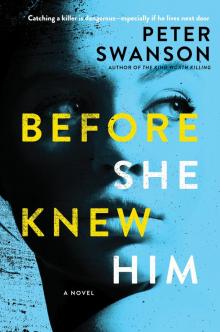 Before She Knew Him
Before She Knew Him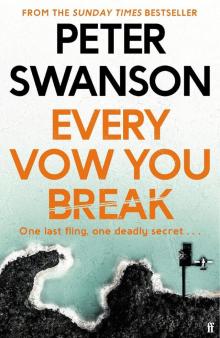 Every Vow You Break
Every Vow You Break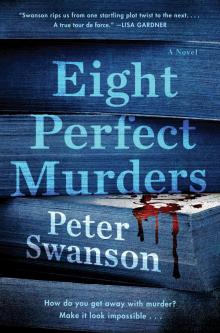 Eight Perfect Murders
Eight Perfect Murders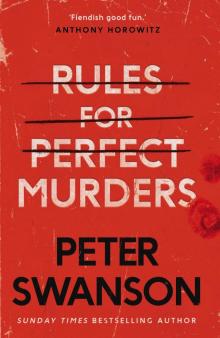 Rules for Perfect Murders
Rules for Perfect Murders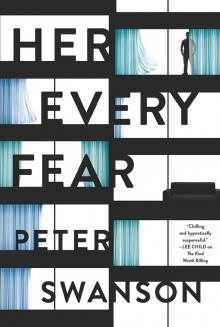 Her Every Fear
Her Every Fear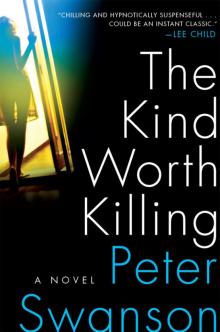 The Kind Worth Killing
The Kind Worth Killing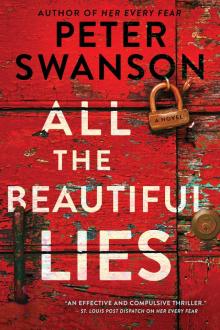 All the Beautiful Lies
All the Beautiful Lies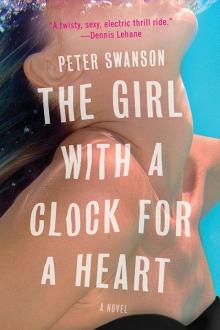 The Girl with a Clock for a Heart: A Novel
The Girl with a Clock for a Heart: A Novel